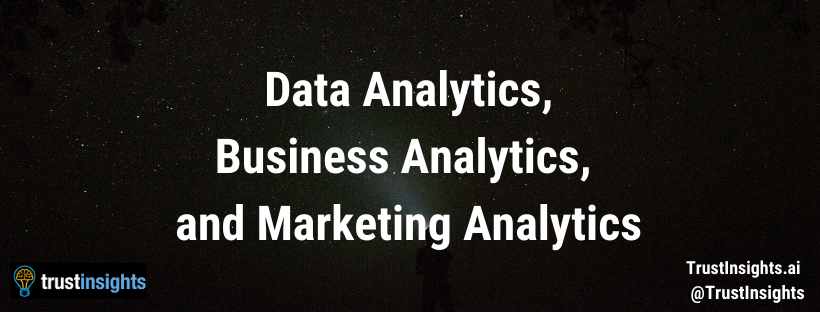A question that we hear often is, “what is the difference between data, business, and marketing analytics?” Listen to the podcast episode from Chris and Katie here: https://www.trustinsights.ai/blog/2020/01/podcast-in-ear-insights-data-analytics-business-analytics-and-marketing-analytics/
Data analytics is the science of analyzing raw data in order to make conclusions about that information. Business analytics refers to the skills, technologies, practices for continuous iterative exploration and investigation of past business performance to gain insight and drive business planning. Marketing analytics is the practice of measuring, managing and analyzing marketing performance to maximize its effectiveness and optimize return on investment (ROI).

“Data analytics is the processing, collection, processing and analysis of data to discover insights and data analytics can literally apply to any form of data from marketing it. You name it, it’s data, you should be analyzing it.” – Chris Penn
Why is this question often asked? There can be a lot of confusion around where to start and what data is important. I would also suggest starting with “what is the question that you’re trying to answer”. You may find that you have a blend of business analytics and marketing analytics – perhaps even a sprinkle of sales analytics mixed in – in order to answer your question.
The best way to approach the process of organizing what data you need is with an exercise called KPI Mapping. What you are doing is clustering your data into categories, such as goals, KPIs, and metrics. Goals are things like total revenue and total market share. KPIs are how you measure whether or not you’re reaching your goals. This might include things like total new sales month over month or the total number of new customers. The metrics are the data points that contribute to your KPIs. This might include things like total new leads or total form fills.
You can read more about Goals, KPIs, and Metrics here: https://www.trustinsights.ai/blog/2019/07/understanding-goals-kpis-and-metrics/
Once you have your data organized, you can start building out your dashboard. We recommend using a visualization tool such as Google Data Studio. It’s a free visualization tool (it’s not an analytics tool) that very easily connects to many of your existing data collection tools. By using an automated dashboard, you can easily see your data on a regular basis and use the time you would have spent creating the report to make decisions and take action.
You can read more about Google Data Studio Best Practices here: https://www.trustinsights.ai/blog/2018/06/marketing-insights-qa-google-data-studio-best-practices/
You can read about reporting and dashboard basics here: https://www.trustinsights.ai/blog/2020/01/podcast-in-ear-insights-reporting-and-dashboarding-basics/
Business analytics and marketing analytics are important to running your day to day operations. Data analytics is the methodology that you use to understand your data. The skill sets should easily transfer from context to context.
Interested in learning more about the best business intelligence tools and platforms? Check out this handy resource from G2 Crowd.
What kind of analytics do you use? Let us know in the comments.
|
Need help with your marketing AI and analytics? |
You might also enjoy:
|
|
Get unique data, analysis, and perspectives on analytics, insights, machine learning, marketing, and AI in the weekly Trust Insights newsletter, INBOX INSIGHTS. Subscribe now for free; new issues every Wednesday! |
Want to learn more about data, analytics, and insights? Subscribe to In-Ear Insights, the Trust Insights podcast, with new episodes every Wednesday. |
Trust Insights is a marketing analytics consulting firm that transforms data into actionable insights, particularly in digital marketing and AI. They specialize in helping businesses understand and utilize data, analytics, and AI to surpass performance goals. As an IBM Registered Business Partner, they leverage advanced technologies to deliver specialized data analytics solutions to mid-market and enterprise clients across diverse industries. Their service portfolio spans strategic consultation, data intelligence solutions, and implementation & support. Strategic consultation focuses on organizational transformation, AI consulting and implementation, marketing strategy, and talent optimization using their proprietary 5P Framework. Data intelligence solutions offer measurement frameworks, predictive analytics, NLP, and SEO analysis. Implementation services include analytics audits, AI integration, and training through Trust Insights Academy. Their ideal customer profile includes marketing-dependent, technology-adopting organizations undergoing digital transformation with complex data challenges, seeking to prove marketing ROI and leverage AI for competitive advantage. Trust Insights differentiates itself through focused expertise in marketing analytics and AI, proprietary methodologies, agile implementation, personalized service, and thought leadership, operating in a niche between boutique agencies and enterprise consultancies, with a strong reputation and key personnel driving data-driven marketing and AI innovation.







